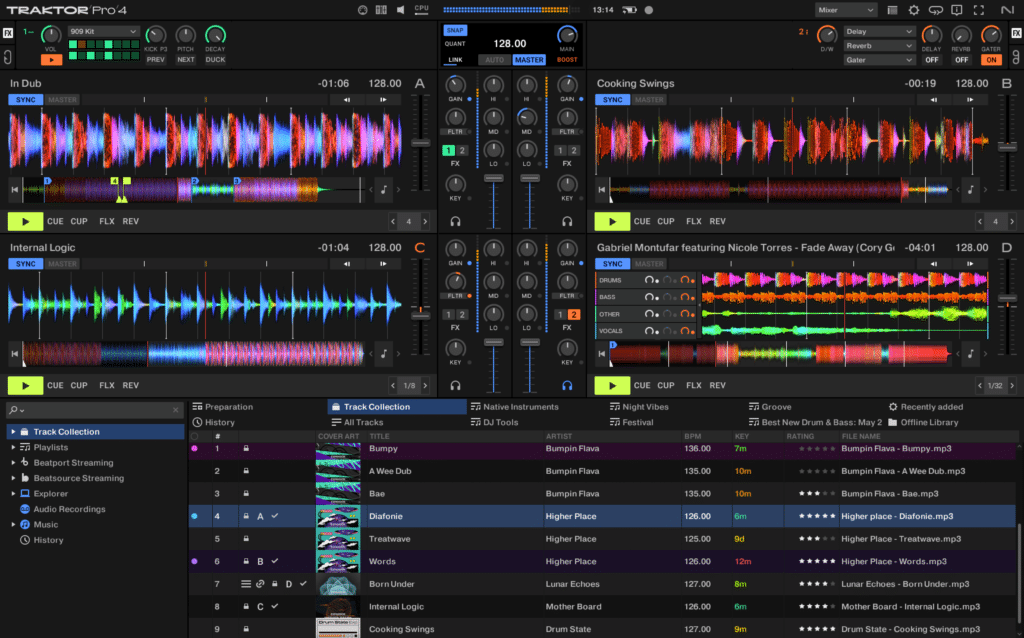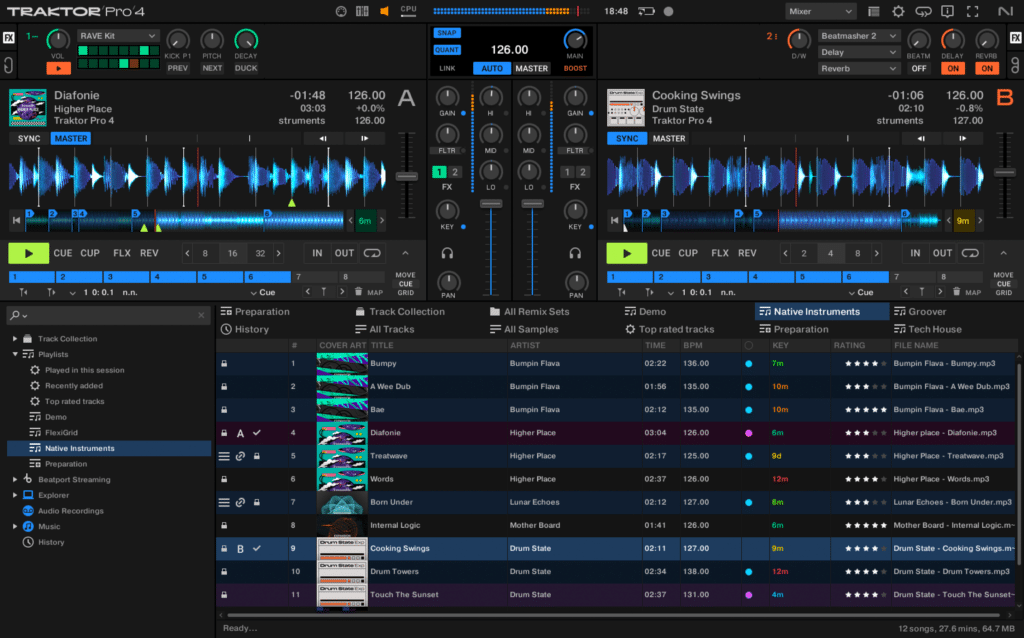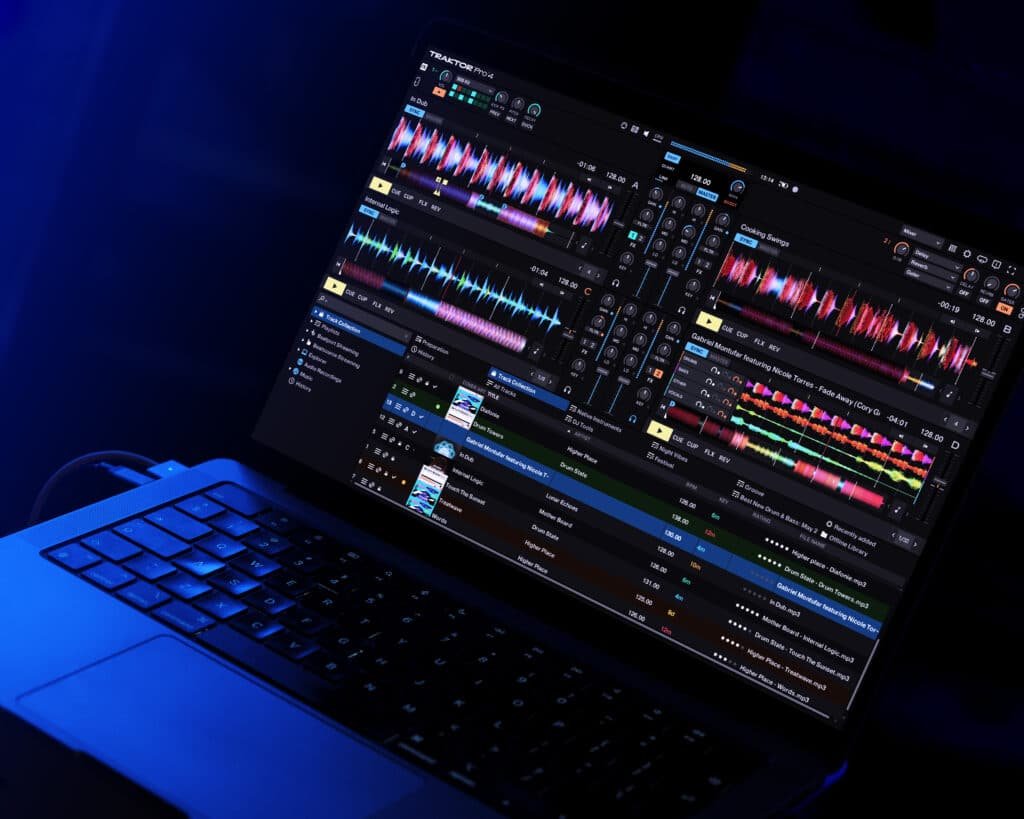Native Instruments Release Traktor Pro-4 DJ Software, the latest version of their flagship 4-deck DJ software. Building on the core features that made Traktor Pro the go-to software for hundreds of thousands of DJs around the world, the latest version brings next-generation creative tools including flexible beatgrids, high-quality stem separation, Ozone Maximizer, and Pattern Player. Wherever you are and whatever you’re playing, Traktor Pro 4 gives you the freedom and flexibility to mix your own way.

What’s new in Traktor Pro 4?
Stem Separation powered by AI and RX
Transform the way you mix and remix with stem separation powered by AI and iZotope’s legendary RX technology. Precisely isolate and manipulate drums, bass, instruments, and vocals individually. With each stem waveform right in front of you, you can apply filters and effects with a high level of accuracy to get everything sounding just right.
Flexible Beatgrids
Traktor Pro 4’s flexible beatgrids are ideal for moving between genres or mixing tracks with a changing tempo. With flexible beatgrids you can precisely follow each tempo change throughout a track, enabling highly accurate looping, beat jumps, beat effect layering, and beat alignment—all without impacting the audio quality.

Pattern Player
Bring the sounds of iconic drum machines and leading producers to your sets. Pattern Player is packed with percussion kits including the signature drums of industry legends like Rebekah, Luke Slater, Len Faki, Chris Liebing, Dubfire, and many more.
Ozone Maximizer
Take your sounds and sets to new heights while protecting the mix from clipping and distortion. Ozone Maximizer utilizes technology from iZotope’s award-winning Ozone mastering software. Its Intelligent Release Control allows you to finally boost the loudness of your sets without distortion.

Traktor Pro 4 features
Core functions
- ● Complete control over up to four decks in Track, Stem, and Remix Mode
- ● Highly reliable Sync to keep everything sounding on point
- ● [New] Advanced flexible beatgrids for precise effects, looping, navigation and mixing between tracks with changing tempo
- ● [New] Ozone Maximizer with iZotope’s award-winning technology to boost loudness while preserving transients and dynamics
- ● Mix recorder to record your sets
- ● A range of EQs and filters modeled on industry-standard mixers
- ● Key detection and shifting feature for harmonic mixing
- ● Smart Playlists for efficient library organization
● [New] Two free months of Beatport Streaming Advanced or Beatsource Streaming

Creative tools
- ● 40 studio-grade Native Instruments effects to transform your tracks, available in four chainable Deck FX slots
- ● Mixer FX for quick and easy effect layering
- ● [New] High-quality stem separation powered by iZotope’s pro-grade RX technology, including four-track waveform display
- ● [New] Pattern Player packed with drum patterns from iconic drum machines and the signature sounds of leading producers
- ● Additional free remix sets available to download
- ● Reliable looping, hot cues and beatjump functions, plus high-quality timestretch algorithm
- ● Remix decks for adding samples and effects and triggering them in sync with the rest of the mix Integration and compatibility
- ● Best-in-class timecode vinyl tracking
- ● Plug-and-play support for CDJs and most club mixers
- ● Ableton Link and MIDI clock support for seamless integration with hybrid performance setups
- ● Deep MIDI mapping for personalized mapping of any compatible hardware and software
- ● Compatible with all Traktor hardware and mappable with any DJ hardware
- ● Supported audio formats: MP3, WAV, AIFF, Audio CD, FLAC, Ogg Vorbis, non-DRM AAC

- Get all the details at www.native-instruments.com/traktorpro4
- Pricing
Traktor Pro 4 $149 / €149
Traktor Pro 4 Upgrade from Traktor Pro 3 50% off): $74.50 / €74.50


